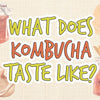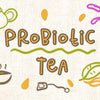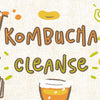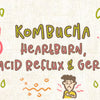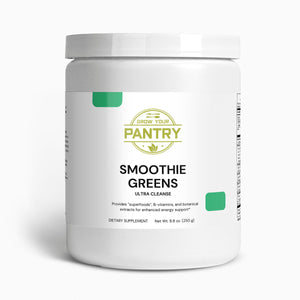Kombucha Vs Kefir | The Detailed Breakdown
When it comes to fermented drinks, kombucha and kefir are both great for different reasons.
Kefir holds the upper hand in terms of having a higher amount of lactic acid bacteria (LAB). LAB is an order of gram-positive acid-tolerant bacteria that control the gut matter maintaining it in a healthy condition.
While kombucha lacks proteins, it has a substantial amount of caffeine and probiotics. Kefir also has other advantages such as the presence of prebiotics and probiotics
Kombucha has been around for longer compared to kefir, however, both of these drinks are still in their infancy stage when it comes to scientific research. This is gradually changing as more scientists begin to examine the overall effect of the drinks. However, it's generally agreed that the current scientific research does prove that fermented beverages such as kefir and kombucha do play a role in overall gut health.
Not Much Time? Skip To What You'd Like To Learn...
-
What Is Kombucha?
-
What Is Kefir?
-
Making: Kombucha Vs. Kefir
-
Health Benefits: Kombucha Vs. Kefir
-
Differences: Kombucha Vs. Kefir
-
Flavor: Kombucha Vs. Kefir
-
Risks Of Drinking: Kombucha Vs. Kefir
-
Kefir and Kombucha Cross-Contamination
-
Who Can't Drink Kombucha and Kefir?
-
Considerations Before Buying Raw Kombucha
-
Considerations Before Buying Kefir
-
FAQs
What Is Kombucha?

Kombucha is a fermented tea that's prepared using freshly brewed and sweetened tea. The variety of tea leaves used will vary from one brew to the other as kombucha can be brewed using green, black, or white tea leaves as well herbal teas such as rooibos. The same can be said of the sugar used to sweeten the tea, whereby you can use regular white or brown sugar, cane juice extract, or even molasses.
After the tea leaves are steeped, the tea is allowed to cool to room temperature before being transferred to the fermenting jar and finally adding the SCOBY, which is an acronym for symbiotic culture of bacteria and yeast. This is essentially the source of yeast and bacteria culture. Kombucha takes typically 7 to 14 days to ferment during which the culture feeds on the sugar releasing carbon dioxide, which produces fizziness.
What Is Kefir?

Kefir is a fermented yogurt-like drink with a tangy flavor and billions of good yeast and bacteria. Kefir is prepared by adding probiotics to milk or water.
Water Kefir: This is a probiotic-rich beverage that's dairy-free and has a lighter taste meaning it can be flavored in multiple ways. The drink is prepared using mineral-rich water, such as coconut water or spring water. Avoid water that's low in mineral content such as reverse osmosis water and distilled water.
Milk Kefir: This is a probiotic beverage with a delightfully tangy flavor and is sometimes considered as drinkable, thinner yogurt. Milk kefir is prepared using either powdered kefir starter or milk kefir grains. There are added to dairy milk, e.g., cow milk, camel milk, and goat milk.
Plant-Based Milk Kefir: Kefir can also be prepared using plant-based milk. It's the extract from various plants such as rice, almond, and soy. The kefir grains are then introduced to the plant-based milk to give a probiotic-rich and creamy drink.
Making: Kombucha Vs. Kefir

Kombucha:
Preparation Time: 45 minutes
Ingredients: Sugar, tea leaves, starter tea, and water
Brewing Time: 7 to 14 days
Difficulty: Relatively easy
Cost: Initial cost of acquiring a fermentation kit might be considerable
When it comes to brewing kombucha, the process is much more intense and takes longer before the drink is fermented optimally. The process requires you to obtain a SCOBY, starter culture (this is previously brewed kombucha), tea leaves, sugar, and glass jars. This can be quite complicated, especially if it's your first time brewing.
Kefir:
Preparation Time: Less than 5 minutes
Ingredients: Dairy milk or plant substitute, kefir grains
Brewing Time: 24 hours
Difficulty: Easy to set up
Cost: Relatively cheap
Preparing kefir is much easier; the process involves fermenting either water, dairy milk or plant-based milk with kefir grains or powdered kefir starter. The process is much faster and takes about 24 hours to ferment fully. Kefir can then be flavored using honey, vanilla extract, cocoa powder, or even cinnamon during the second ferment.
Health Benefits: Kombucha Vs. Kefir

Although kefir and kombucha are both rich in beneficial microbes, there's a definite difference in terms of composition and nutritional benefits.
Probiotics
Both of these drinks have billions of probiotics in every serving; however, kefir has the upper hand when it comes to LAB so much so that it can even be considered as a probiotic supplement. While kombucha can be regarded as a digestive aid instead.
Caffeine
Caffeine is almost like a double-edged sword; on the one hand, it helps in maintaining attention and staying alert while, on the other hand, it can be quite addictive. Ultimately it's a personal choice whether you want to consume caffeine. Kombucha contains a small amount of caffeine from the tea leaves used to brew. Alternative herbal teas, such as rooibos tea, can offer a caffeine free option.
Kefir, on the other hand, doesn't contain caffeine as the ingredients used are caffeine-free. On the downside, it lacks the numerous health benefits associated with caffeine.
Nutrient Content:
Nutrients per 8 oz serving |
Kefir |
Kombucha |
Sugar |
12g |
4g |
Calories |
110 |
34 |
Protein |
11g |
0g |
Caffeine |
0 |
10-18mg |
Alcohol |
0.5%-1% |
0.5%-8% |
Raw kombucha contains other nutrients in trace amounts such as vitamin B complex, thiamin, which helps in the metabolism of carbohydrates into energy, and niacin which plays a significant role in lowering cholesterol.
Raw kombucha also contains caffeine, which helps with alertness and antioxidants from the tea, which react with free radicals, thus preventing cellular degeneration, which would have been caused by free radicals. The brew also contains billions of important probiotics that help maintain a healthy gut system.
Kefir, on the other hand, is a much more abundant source of nutrients due to its primary ingredient; milk. 1 cup of low-fat dairy kefir contains 110 calories, 11g of protein which goes towards maintaining cells, 2g fat and 12g carbs for energy supply, 390 milligrams calcium which is vital for healthy bones and teeth, 90 micrograms vitamin A which is required for healthy skin and vision.
Differences: Kombucha Vs. Kefir

Factor |
Kefir |
Kombucha |
Taste |
Creamy with a tart flavor |
Sour flavor |
Ease of making |
Very easy to make |
Requires various processes before the tea is fully fermented |
Price |
More expensive as it requires ingredients which may not be locally available |
Less expensive as it requires locally available ingredients |
Accessibility |
There are not many brands available as the drink is not as popular as kombucha |
Available both online and in local groceries |
Ferment time |
24 hours |
7 to 14 days |
Flavor: Kombucha Vs. Kefir

Kefir has a creamy texture with a tart flavor that can be adjusted by adding a secondary flavoring such as honey, vanilla extract, cocoa powder, or even cinnamon. The smooth, creamy texture makes kefir perfect for smoothies. The rapid fermentation usually takes 24 hours, giving it a tangy flavor while retaining hints of the dairy product used.
Kombucha, on the other hand, has a sweet-sour taste. This is due to the sweet tea that's used in the first ferment. During the second ferment, fruit or spice flavor can be used to infuse the raw kombucha to add flavor, as well as making it fizzier. Kombucha takes much longer to brew and can have a more distinctively tart flavor when compared to kefir. If you're interested in more recipes, check out our article 51 Unique Kombucha Flavors and Recipes.
Risks Of Drinking: Kombucha Vs. Kefir

Lactose
Kefir can be prepared using dairy products that contain lactose; however, the bacteria culture breaks down much of the lactose during the fermentation stage. As a result, kefir has been shown to help improve lactose tolerance, however, consult a doctor before consuming (link). Due to the ingredients, kefir is not vegan or suitable for anyone with dairy allergies.
Kombucha, on the other hand, is lactose-free as it doesn't rely on dairy products.
During pregnancy and breastfeeding
Kombucha contains caffeine and alcohol content ranging from 1.5% to 5%, depending on the brewing conditions. Both alcohol and caffeine pose a risk to the unborn baby as well as during breastfeeding. As a result, it is recommended to avoid kombucha during pregnancy and breastfeeding.
Kefir can also contain trace amounts of alcohol, please consult your doctor before consuming any fermented products during pregnancy and breastfeeding.
Abdominal discomforts
Kombucha can also cause bloating due to the considerable amount of dissolved carbon dioxide, causing stomach upset and bloating. To avoid such complications, its recommendable to start with a small amount of kombucha until your gut is fully acclimatized to the new brew.
Dairy-based kefir can trigger adverse reactions resulting in bloating, nausea, constipation, and intestinal cramping. It's recommended to start in small amounts, such as 2 oz per serving. If you experience any of these side effects, you should reduce your consumption.
Weakened immune system
Both kefir and kombucha contain an actively growing culture of yeast and bacteria. As a result, there's concern about what kind of damage such bacteria can cause a weakened immune system as it may lead to infections. AIDS patients, chemotherapy patients, and patients on immunosuppressive drugs can be particularly susceptible.
Interactions with Drugs
Kefir and kombucha interact with immunosuppressants and may lead to increased chances of falling sick. These drugs include azathioprine, Imuran, zenapax, prednisone, and corticosteroids.
Kefir and Kombucha Cross-Contamination

Cross-contamination, in this case, refers to the transfer of cultures between kefir or kombucha during fermentation and the problems it causes. These foreign bacteria cultures can result in unpleasant taste and aroma or even damage the cultures used in the separate fermentations.
How can kefir and kombucha cross-contamination happen?
-
Using improperly cleaned jars and utensils during the fermentation process.
-
Handling the fermenting brews with unclean hands or while chopping and mixing ingredients.
-
Wooden utensils used to mix the brews might retain bacteria culture from earlier projects.
-
Keeping fermenting cultures close together can cause airborne cross-contamination to take place.
-
Keeping fermenting cultures close to ambient bacteria sources.
Who Can't Drink Kombucha and Kefir?

Diabetic Patients
Some kefir brands rely on fruit flavoring and extra sugar, which leads to increased blood sugar levels. This can be threatening to diabetic patients as, on average, an 8 oz serving of Low Fat Strawberry Kefir can have 20g of sugar.
Despite using sugar to make kombucha, unflavored kombucha usually contains a low amount of sugar after fermentation as most of it gets broken down by the culture. The flavored varieties, on the other hand, contain additional sugar either from the flavoring ingredients such as fruits or additional sugar, which is added to make the drink fizzier. In such a case, some of the sugar may be left undissolved, and thus the culture wouldn't break it down. To avoid the uncertainty of whether the drink will contain too much sugar, please consult a doctor before consuming it.
Pregnant and breastfeeding women
While there are not enough studies to examine the results of drinking kefir or kombucha while pregnant, it is recommended to avoid these fermented beverages. This is because pregnant women are more likely to contract an infection through foodborne bacteria, which is plentiful in the unpasteurized two drinks. Both of these fermented beverages contain leftover alcohol from the aerobic fermentation process. This poses a risk to the developing child hence the need to avoid the drinks.
Weakened Immune System
AIDS patients have a weakened immune system, thus increasing the probability of contracting an infection from the billions of yeast and bacteria cells contained in kombucha and kefir. Patients who are also on immunosuppressant drugs or chemotherapy should avoid the ferments due to increased chances of contracting an infection.
Considerations Before Buying Raw Kombucha

Flavor
Various kombucha brands rely on their recipes for the second ferment, which infuses the flavor. This process can result in increased sugar levels in the kombucha if sugar-rich fruits, or additional sugar is used to flavor the brew.
Price
The price of kombucha varies dramatically. We recommend bottled raw, unpasteurized kombucha. It is usually affordable, and it can also be used as a starter when homebrewing. We recommend buying this over flavored and pasteurized kombucha, which tend to be more expensive, with far less health benefits.
Sugar content
The sugar content in your kombucha will be determined by the ingredients used and the length of the ferment. If you are trying to cut down on your sugar intake, opt for kombucha, which has been fermented for longer and is unflavored. On average, an 8 oz serving of kombucha contains 5g of sugar while a similar serving of kefir contains 12g of sugar.
Alcohol content
The alcohol content in kombucha arranges from 1.5% to 5% depending on the fermentation conditions.
Probiotic content
Fermented kombucha, which has not been pasteurized, contains billions of naturally growing bacteria and yeast culture. The culture is in a natural symbiotic balance, which makes it impossible for one species to take over the entire culture.
Serving size
While shopping for kombucha, it's recommended to always keep in mind that not all bottle sizes are guided by serving size. It's common to see a regular 8-12oz bottle containing two or more servings. This should be monitored to avoid overconsumption, which would substantially increase your sugar intake.
Considerations Before Buying Kefir

Flavor
The taste of kefir will be significantly influenced by the type of milk used and the length of the ferment. If left to ferment for too long, kefir gains a sour taste, and the texture becomes more effervescent. Secondary flavors may also be added to the drink to give it a more distinctive flavor. However, these are more likely to contain added sugar, which is unhealthy.
Alcohol content
Kefir that's been naturally fermented with kefir grains and a milk source that contains sugar will have an alcoholic content up to 1.5%.
Sugar content
Kefir contains sugar from the milk used to ferment and any flavoring that may be added later on, such as fruit juice flavoring. While a substantial amount of the sugar is broken down during fermentation, the drink still does contain quite a considerable amount of sugar and fat, which results in a high-calorie count. The sugar in kefir comes from the primary ingredients such as dairy milk and coconut milk in the form of soluble carbohydrates.
Lactose content
Kefir that's prepared using dairy products such as goat, cow, and camel milk will have some lactose content leftover even after fermentation. If you are highly sensitive to lactose, then it’s best to stay on the safe side and avoid the drink. Goat milk has been shown to be much better for the digestive system compared to other dairy sources due to its higher nutritional count and the fact that it's easier to digest.
Probiotic content
Kefir, just like any other fermented drink, does contain live bacteria and yeast culture. Always opt for natural amounts of probiotics in store-bought kefir instead of pasturized brands which add probiotics to the final brew.
FAQs

Can you drink kombucha and kefir on the same day?
Yes, it's perfectly healthy to have kombucha and kefir on the same day. Just don't do it at the same time as this can result in bloating due to excessive gas. The FDA recommends limiting the amount of kombucha you drink per each serving to not more than 4 oz and not more than three times per day.
How much kefir should I drink daily?
While there's no exact science behind this, its recommended to keep your daily kefir intake between 1 to 2 cups.
Does kefir make you poop?
Yes, kefir contains numerous probiotic cultures that help in maintaining a healthy gut and may help alleviate constipation.
Is it OK to drink kefir every day?
Yes, it is perfectly healthy to drink kefir daily. However, while starting, it's recommended to begin with smaller amounts.


